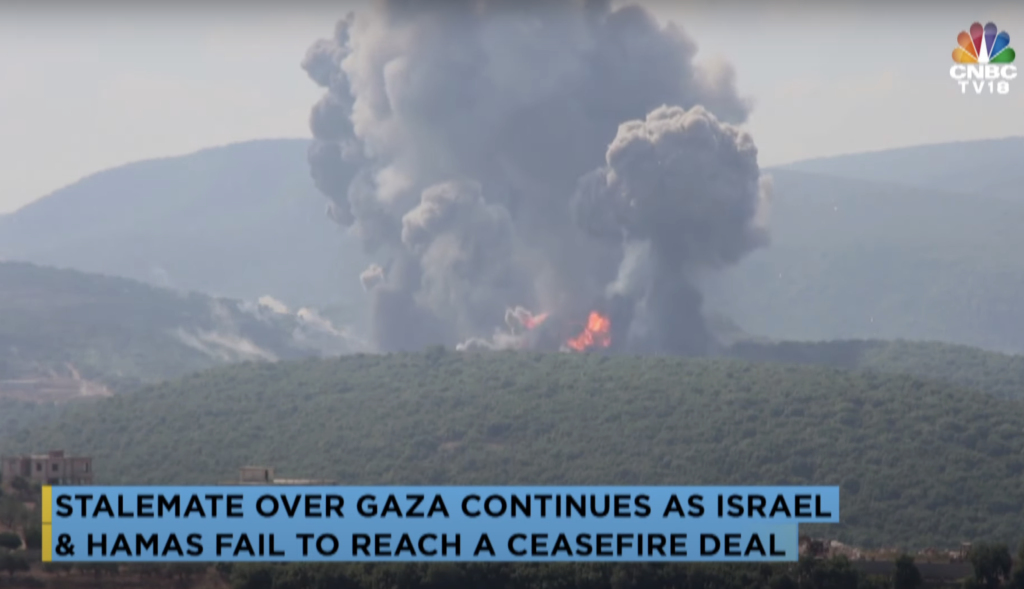Gaza War: Analysis of Ceasefire Agreement Failure

By: Ghassan Rubeiz / Arab America Contributing Writer
Both Israel and Hezbollah claimed victory in this weekend’s exchange of fire across the Lebanese border. The fighting is currently contained, but the area remains a tinderbox. None of this interrupted the negotiations in Cairo toward a Gaza ceasefire. But what was described as a final attempt to bridge the differences between Hamas and Israel has failed. On Sunday, Hamas rejected the latest ceasefire proposal, which stipulated Israel’s continued military presence in Gaza. This bad news should not come as a surprise. The negotiations have framed the conflict too narrowly; the US is complicit in Israel’s criminal conduct, and the incentives for peace have been skewed in Israel’s favor.
Israel and the US have not approached the dynamics of this war in good faith. October 7 has been framed as an unprovoked crime against an innocent nation. By positing October 7 as the start of hostilities, Israeli negotiators were able to avoid discussing their occupation of Arab land, which is at the heart of the war. The war in Gaza was portrayed as a legitimate response to a terrorist attack. The killing of civilians and the massive destruction of Gaza were labeled as perhaps excessive but “understandable” natural security measures. The ceasefire was narrowly focused on freeing Israel’s hostages in exchange for Palestinian prisoners. Hezbollah’s mobilization on the Lebanese border, in solidarity with Gaza, has also been considered terrorism. The ongoing ethnic cleansing in the West Bank has not been deemed relevant; neither has Iran’s relations with Israel and the US. In short, the ceasefire has failed because it has focused on symptoms rather than causes.
Another major flaw in the discussions has been the morally questionable role of the United States. The US, which has dominated the process, has been an indirect participant in the violence and is thus complicit. Since the Six Day War of 1967, the US has helped Israel occupy Arab land, maintain it, and in some cases (such as the Syrian Golan Heights and East Jerusalem) annex it. During the Gaza war, Israel has received scores of arms shipments and 28 billion dollars in less than a year. The US has also served as the main diplomatic supporter and physical protector of Israel as it helped itself to more and more land.
Finally, the incentives for ending the fighting have been skewed in Israel’s favor. No part of the ceasefire proposal acknowledges Israel’s responsibility for the massive killing of civilians, ethnic cleansing, or creating the conditions for famine and epidemics. After months of negotiations, the major sticking point in reaching a ceasefire agreement is whether Israel should stay in Gaza or withdraw. The latest ceasefire proposal has Israeli forces staying in Gaza after the hostage-prisoner exchange. If Israel stays in Gaza after this war ends, it will effectively become an occupying force for an indefinite time. If Hamas agreed to confront Israeli forces after the hostages were freed, it would be surrendering Gaza to this occupier and effectively committing political and military suicide.
If, on the other hand, Israel agrees to withdraw from Gaza after the captives’ exchange, it can still claim to have “defeated” Hamas militarily, “punished” political resistance, found reasonable means for achieving security, and sought ways to improve its international image. It would then be possible to open a dialogue on the future of Gaza and the West Bank, on a border treaty with Lebanon, and on other Israeli-Arab- Iranian issues.
The Biden administration has failed to understand the historical and regional context of the war in Gaza. It has naively claimed that it has the key to resolving this war. It has failed to put firm pressure on Israel to do the right thing for its future and the future of the region. If the Gaza war does not end soon, an all-out war between Lebanon and Israel can be expected. The remaining Israeli hostages will be doomed, and the region will take yet another step towards violent chaos.
Ghassan Rubeiz is the former Middle East Secretary of the World Council of Churches. Earlier he taught psychology and social work in his country of birth, Lebanon, and later in the United States, where he currently lives. For the past twenty years, he has contributed to political commentary and delivered occasional public talks on subjects related to peace, justice, and interfaith. You can reach him at rubeizg@gmail.com
The views and opinions expressed in this article are those of the author and do not necessarily reflect the position of Arab America. The reproduction of this article is permissible with proper credit to Arab America and the author.
Check out our Blog here!








